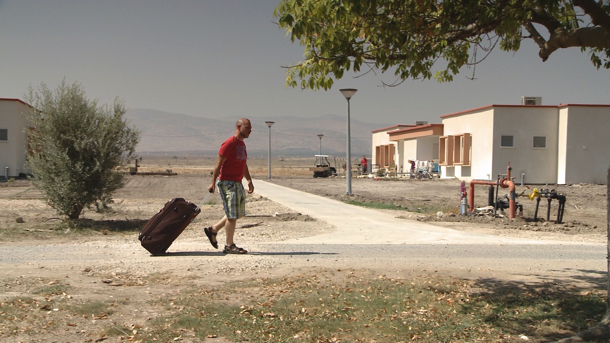
Director: Tomer & Barak Heyman; Documentary; Israel/UK/Germany 2016, 84 min.
Tomer and Barak Heyman (Bridge over the Wadi) have always combined the personal and socio-political in their longterm documentaries shot mainly in Israel where Barak produced the award winning Lady Kul el Arab by the Palestinian filmmaker Ibtisam Mara’ana. This was a manifestation of her brother’s political statement showing a divided Israel, trying in vain to come to terms with a permanent war against Palestine.
Saar Maoz, the central figure of WHO’S GONNA LOVE ME NOW? is forty and lives in London. For the past eleven years he has been HIV Positive. An ordinary gay man, he sings in the London Gay Men’s Chorus but his life is ruled by the medication he takes which often has side effects ranging from nausea and muscle cramps to very disturbed sleep patterns. What makes Saar’s life even more difficult is his relationship with the family in Israel, where he grew up on a Kibbutz with six siblings. His father is a paratrooper who tells everybody with pride that all his children served in the same military branch like him, and he parachuted “with all of them, even the girls”.
During one of Saar’s visits; his father, in uniform, shows guests around the military monument “Ammunition Hill”, proclaiming a rather belligerent, un-reflective ideology of Israel’s right to annex Palestinian territories. Prior to this we had witnessed Saar reading a letter from his father, which is insulting on a personal level as his political ravings in Israel. But Saar still craves the love of his family and blames them for his being thrown out of the Kibbutz, when his homosexuality became apparent: “They should have said, we are all going to leave the Kibbutz, if you exclude our son”. Obviously, this was far from realistic.
The only person who loves Saar unconditionally is his grandfather, who is old and frail, and will die during the filming. When Saar’s mother comes to London later she is helpless and has obviously not come to terms with her son’s homosexuality: “You are like a branch without continuity”. Whilst she loves Saar, she still hopes he will give up s his sexual orientation. During the film, Saar becomes a little more realistic: when walking with a friend round Brompton Cemetery, he remarks sarcastically that the Kibbutz will bury him, but “hey we’ll put that Queer only in the far away corner”.
When his father visits Saar in London he also displays a huge degree of insensitivity: sitting in an outdoor café, he remarks loudly to his son “are these also gay?’ when two young women walk by. Later he asks Saar “who is gay here?” as if the promenading people were so easily classified. But Saar’s parents are not the worst – by far. When Saar finally decides to go back to Israel, working for The ‘Israel Aids Task Force’, his younger brother is openly hostile: he is afraid his small children may get infected “when you move here, the risks are so much greater”.
The great strength of the film is the long-term observation, making the awareness (or lack of it) of the Maoz family much more apparent. Filming in London and Israel, the scale of the different environments is huge: the man employing Saar at the Aids Task Force points this out to him. But Saar is set for a reunion with his family in a country which will not welcome him with open arms: he will be a stranger both at home and in a society geared to male values, needed Israel is a militaristic society. The images are clear and well-0bserved, there is humour here but also overriding sadness for Saar, who wants more than anything to come home, without being really wanted by those he loves and values. AS
ON RELEASE FROM 6 April 2017